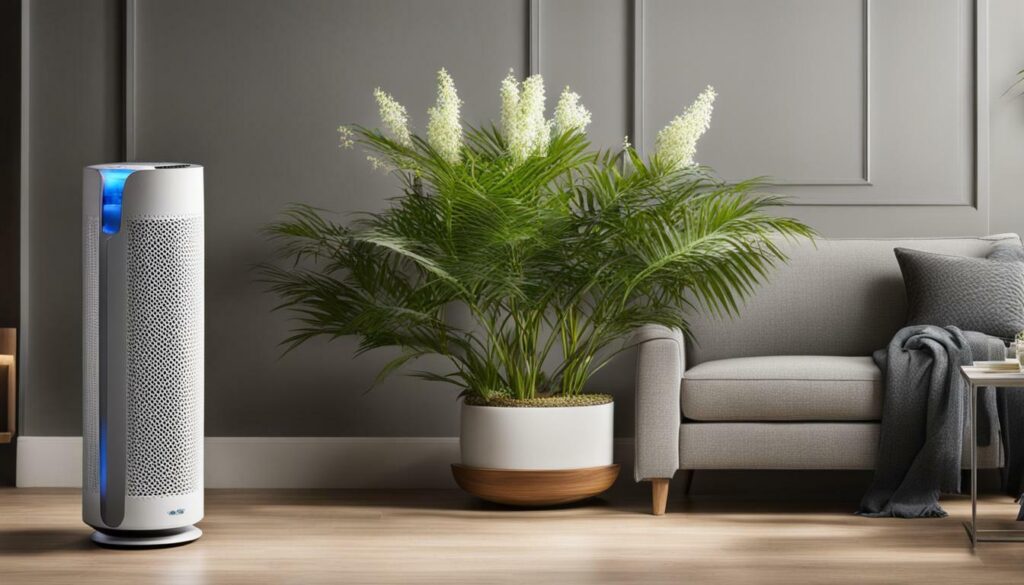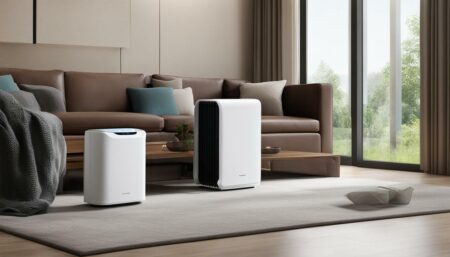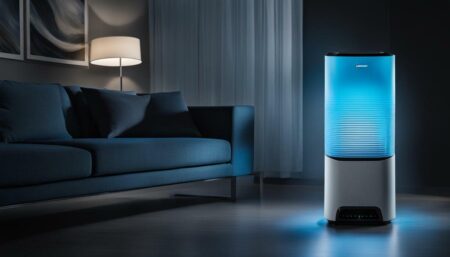If you or a loved one suffers from asthma, you know how important it is to manage symptoms and maintain a healthy living environment. One simple but effective tool in the fight against asthma triggers is an air purifier.
Air purifiers are designed to filter out pollutants, allergens, and other irritants from the air, creating a healthier, cleaner environment for breathing. For individuals with asthma, this can mean relief from common triggers like dust, pet dander, and pollen.
But how do air purifiers work, and what should you look for when selecting the right one for your needs? In this article, we will explore the link between air purifiers and asthma relief, the benefits of using an air purifier for respiratory health, and the top-rated air purifiers on the market for individuals with asthma.
Key Takeaways:
- Air purifiers can be an effective tool in managing asthma symptoms by removing pollutants and irritants from the air.
- Choosing the right air purifier for your needs is important, considering factors such as the type of purifier, filtration system, and room size.
- In addition to using an air purifier, other strategies for improving indoor air quality include regular cleaning, minimizing sources of pollution, and proper ventilation.
- The benefits of using an air purifier for asthma management include reducing symptoms, minimizing triggers, and creating a healthier living environment.
- Top-rated air purifiers for individuals with asthma include models specifically designed to capture allergens and pollutants effectively.
Reviews and Recommendations: Best Air Purifiers for Asthma
When it comes to selecting the best air purifiers for individuals with asthma, there are several top-rated options available in the market. These air purifiers are specifically designed to capture and filter out asthma triggers, such as allergens, dust, and pollutants.
| Air Purifier | Filtration System | Suitable Room Size |
|---|---|---|
| Winix 5500-2 Air Purifier | 5-stage filtration system with True HEPA filter and PlasmaWave technology | Up to 360 square feet |
| Honeywell HPA300 Air Purifier | 3-stage filtration system with True HEPA filter and activated carbon pre-filter | Up to 465 square feet |
| RabbitAir MinusA2 Air Purifier | 6-stage filtration system with True HEPA filter and customized filter options | Up to 700 square feet |
Table could not be displayed.
These air purifiers are highly effective in reducing asthma symptoms and improving indoor air quality. The Winix 5500-2 Air Purifier offers a comprehensive 5-stage filtration system, including a True HEPA filter and PlasmaWave technology, which neutralizes harmful pollutants and odors. The Honeywell HPA300 Air Purifier is another excellent option, featuring a 3-stage filtration system with a True HEPA filter and activated carbon pre-filter to capture up to 99.97% of airborne particles. For larger rooms, the RabbitAir MinusA2 Air Purifier is a reliable choice, with a 6-stage filtration system that can effectively filter out allergens, toxins, and other pollutants.
When choosing an air purifier for asthma, consider factors like the size of the room, the type of filtration system, and the specific asthma triggers you want to remove from the air. With the right air purifier, you can enjoy cleaner, fresher air and better manage your asthma symptoms.
Asthma-Friendly Air Purifiers for Effective Asthma Relief
If you or a loved one suffer from asthma, you know that managing this chronic respiratory condition is crucial to maintaining a healthy quality of life. One important part of asthma management is maintaining clean and allergen-free air. As such, investing in an asthma-friendly air purifier can provide a significant relief to asthma sufferers.
Asthma is a condition that affects the airways, making it difficult to breathe. It is caused by a combination of genetic and environmental factors, with allergens such as dust mites, pollen, and pet dander being common triggers for asthma attacks. For individuals with asthma, the air they breathe can have a significant impact on their symptoms and overall health. Therefore, it is vital to take proactive steps to reduce exposure to asthma triggers, and an air purifier can help with that.
There are specific features that make an air purifier effective in reducing asthma symptoms. First and foremost is the HEPA (High-Efficiency Particulate Air) filter, which captures particles as small as 0.1 microns, including allergens and other irritants. In addition, asthma-friendly air purifiers often include activated carbon filters, which can help remove odors and chemicals from the air.
When selecting an air purifier for asthma relief, it is essential to consider factors such as the size of the room, the type of filter, and the level of noise produced while in operation. An asthma-friendly air purifier should be quiet, energy-efficient, and have a high CADR (Clean Air Delivery Rate) for optimal air-cleaning performance.
Combined with other asthma management strategies, such as proper medication and regular checkups with a medical professional, an asthma-friendly air purifier can play an essential role in reducing asthma symptoms and overall improving respiratory health.
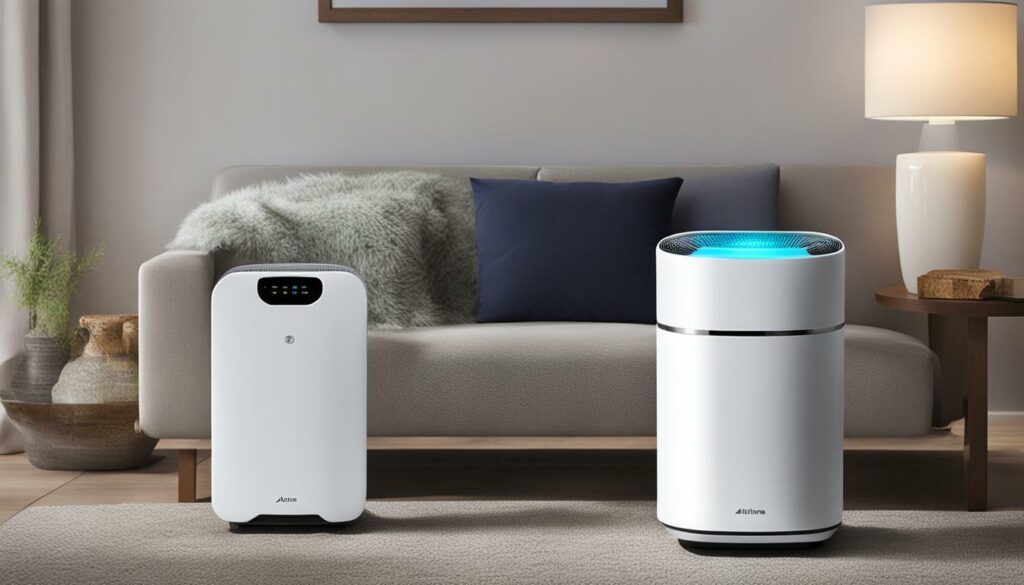
“Asthma-friendly air purifiers offer a practical and effective method of reducing exposure to asthma triggers and improving indoor air quality for asthma sufferers.”
The Link Between Indoor Air Quality and Asthma
Asthma is a chronic respiratory condition that affects millions of Americans, and poor indoor air quality can be a major trigger of asthma symptoms. Common indoor air pollutants like mold, pet dander, dust mites, and volatile organic compounds (VOCs) can all irritate the respiratory system and worsen asthma symptoms. This is why using air purifiers for respiratory health is essential for individuals with asthma.
Studies have shown that using air purifiers can reduce the number of asthma triggers in the air, leading to fewer asthma symptoms. According to the American Lung Association, air purifiers can be a useful tool for individuals with asthma, especially when combined with other indoor air quality strategies like proper ventilation and regular cleaning.
Not all air purifiers are created equal, however. To ensure the best results, it’s important to choose the best air purifiers for asthma. These devices should have a HEPA (high-efficiency particulate air) filter, which can capture small particles like allergens and pollutants. Additionally, some air purifiers may have additional features, such as activated carbon filters to reduce odors or UV-C lights to kill germs and bacteria.
When selecting an air purifier for asthma relief, consider the size of the room you need to purify and the type of filter you need. Portable air purifiers can be ideal for small areas, while larger units may be necessary for larger rooms or open floor plans. It’s also important to choose a device with a filter replacement schedule that fits your needs, as filters can become less effective over time and need to be changed regularly to maintain optimal performance.
By investing in the best air purifiers for asthma, you can improve indoor air quality and reduce asthma triggers in your home or workplace. This can lead to fewer asthma symptoms and a healthier living environment overall.
How Air Purifiers Work: Filtering Out Asthma Triggers
Air purifiers function by filtering out microscopic particles from the air, including those that can aggravate asthma symptoms. For individuals with asthma, choosing an air purifier designed explicitly for capturing allergens and other asthma triggers is crucial for effective management.
The best air purifiers for allergens typically use HEPA (High-Efficiency Particulate Air) filters. These filters are designed to capture particles as small as 0.3 microns, including common asthma triggers such as dust mites, pollen, pet dander, and mold spores.
In addition to HEPA filters, some air purifiers also use activated carbon filters to remove odors and volatile organic compounds (VOCs) from the air, making them an excellent choice for individuals with sensitivities to smells and chemicals.
Other advanced air purifiers may use UV-C light to kill bacteria and viruses, providing an additional layer of protection against respiratory illnesses.
When selecting an air purifier for asthma management, it’s essential to consider the specific needs and situation of the individual. For example, larger rooms may require more powerful air purifiers with higher CADR (Clean Air Delivery Rate) ratings to ensure effective filtration.
Top-rated air purifiers for asthma should have user-friendly controls, quiet operation, and easy filter replacement. Additionally, some air purifiers may come equipped with advanced features, such as air quality sensors and automatic shut-off functions, that offer added convenience and customization.
How Air Purifiers Work: Filtering Out Asthma Triggers
Here are the key takeaway points to remember when choosing air purifiers for allergens and asthma:
- HEPA filters are essential for capturing small particles and pollutants that can trigger asthma symptoms.
- Activated carbon filters can be helpful in removing odors and chemicals from the air.
- Consider the size and CADR rating of the air purifier, as well as any additional features that may be helpful for individual needs.
Choosing an air purifier designed explicitly for capturing allergens and other asthma triggers is crucial for effective management.
Choosing the Right Air Purifier for Asthma
When it comes to selecting an air purifier for individuals with asthma, there are several important factors to consider. By choosing the right air purifier, you can effectively manage asthma symptoms and improve respiratory health.
Types of Air Purifiers
There are several types of air purifiers available, each with their own unique features and benefits. For individuals with asthma, the most effective types of air purifiers are HEPA filters and activated carbon filters.
HEPA filters are designed to capture tiny particles, including pollen, dust mites, and pet dander, which can trigger asthma symptoms. Activated carbon filters are effective at removing chemicals and odors from the air.
Filtration System
When selecting an air purifier for asthma, it is essential to consider the filtration system. The best air purifiers for asthma are those with a multi-stage filtration process, including HEPA filters, activated carbon filters, and pre-filters.
Pre-filters capture large particles, such as hair and pet fur, before they reach the main filter. This not only prolongs the life of the primary filter, but it also ensures that the air purifier is operating efficiently.
Room Size
When choosing an air purifier for asthma, it is important to consider the size of the room in which it will be used. Air purifiers are designed to clean the air in a specific room size, so it is crucial to select a purifier that can handle the square footage of the room where it will be used.
Be sure to check the air purifier’s recommended room size before purchasing to ensure that it will effectively clean the air in your space.
Additional Features
Some air purifiers come with additional features that can improve respiratory health even further. For instance, air purifiers with ionizers can help neutralize and remove particles from the air. Air purifiers with UV-C light technology can kill bacteria and viruses, which can be especially helpful for individuals with asthma who are more susceptible to respiratory infections.
Top-Rated Air Purifiers for Asthma
Some of the best air purifiers for individuals with asthma include the Blueair Blue Pure 211+, Honeywell HPA300, and Coway AP-1512HH Mighty Air Purifier. These air purifiers are designed specifically to remove asthma triggers from the air and improve respiratory health.
By selecting the right air purifier for asthma, you can breathe easier and reduce the frequency and severity of asthma symptoms.
Additional Tips for Improving Indoor Air Quality
Air purifiers are a great tool for reducing asthma triggers and improving respiratory health, but they are not the only solution. Here are some additional tips for maintaining clean and allergen-free air in your home:
- Regular cleaning: Dust, dirt, and pet dander can accumulate quickly in your home. Regular cleaning can help reduce these irritants. Vacuum your floors and carpets frequently using a vacuum cleaner with a HEPA filter. Dust surfaces and furniture using a damp cloth and avoid using harsh cleaning chemicals that can worsen asthma symptoms.
- Minimize sources of pollution: Smoke, fumes, and other pollutants can worsen asthma symptoms. Avoid smoking indoors and limit your use of products that emit strong scents, such as air fresheners, scented candles, and cleaning products. Opt for natural alternatives whenever possible.
- Proper ventilation: Proper ventilation is essential for maintaining good air quality. Open windows and doors when weather permits to allow fresh air to circulate. Use exhaust fans in kitchens and bathrooms to remove excess moisture and pollutants.
By incorporating these tips into your daily routine, you can improve the overall air quality in your home and reduce your risk of asthma triggers.
The Benefits of Using Air Purifiers for Asthma Management
If you or a loved one suffers from asthma, you know how important it is to maintain clean and allergen-free air. Air purifiers can play a significant role in managing asthma symptoms and improving respiratory health.
Air purifiers work by filtering out asthma triggers like allergens, pollutants, and irritants that can contribute to asthma attacks. By removing these particles from the air, air purifiers can help to reduce the frequency and severity of asthma symptoms.
Using air purifiers designed specifically for respiratory health can provide numerous benefits, including:
- Asthma relief: Air purifiers can reduce the number of asthma triggers in the air, leading to fewer symptoms and less reliance on medication.
- Better respiratory health: Cleaner air can improve lung function and reduce the risk of respiratory infections.
- Less allergen exposure: Air purifiers can capture common allergens like dust mites, pet dander, and pollen, providing relief for individuals with allergies and asthma.
- Improved sleep: Breathing clean air can lead to better sleep quality and fewer nighttime asthma symptoms.
While air purifiers alone cannot cure asthma, they can be a valuable tool in managing symptoms and improving quality of life. By reducing exposure to common asthma triggers and pollutants, air purifiers can help individuals with asthma breathe easier and live healthier lives.
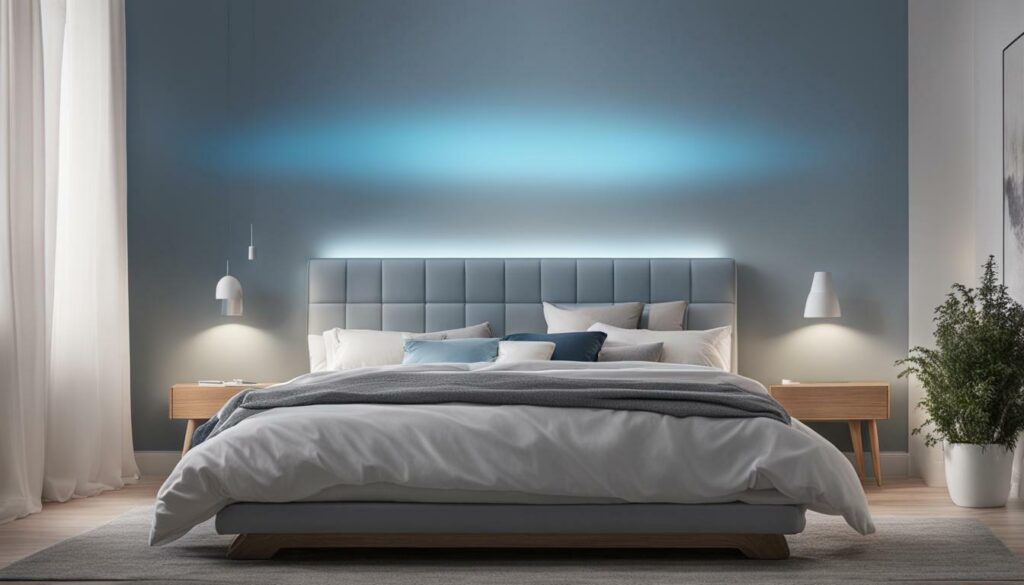
Choosing the right air purifier for your needs is crucial to achieving these benefits. Look for air purifiers with HEPA filters that can capture at least 99.97% of particles as small as 0.3 microns. Air purifiers with activated carbon filters can also be effective at removing odors and chemicals from the air.
In addition to using air purifiers, there are other steps you can take to improve indoor air quality and reduce asthma triggers. Regularly cleaning your home, minimizing sources of pollution, and ensuring proper ventilation can all contribute to cleaner air and better respiratory health.
Overall, air purifiers can be a valuable ally in managing asthma symptoms and improving respiratory health. By selecting the right air purifier for your needs and incorporating other strategies for improving indoor air quality, you can take control of your asthma and breathe easier.
Maintaining and Caring for Your Air Purifier
Proper maintenance and care of your air purifier are essential for ensuring it runs efficiently and provides clean air. Here are some tips for maintaining your air purifier:
- Clean the filters regularly: The filters in your air purifier need to be cleaned or replaced periodically, depending on the manufacturer’s instructions. Clean filters help to maintain the efficiency of the machine, ensure better air quality, and reduce asthma triggers.
- Change filters regularly: To ensure your air purifier continues to work effectively, replace the filters according to the manufacturer’s recommendations. Neglecting to change the filters can lead to a decrease in air quality and increase the presence of asthma triggers.
- Keep the exterior clean: Dust and debris can accumulate on the exterior of your air purifier, making it less efficient in cleaning the air. Cleaning the outside of the machine regularly can help to maintain its effectiveness and prevent allergens and contaminants from spreading in the air.
In addition to these maintenance tips, it’s essential to choose the right kind of air purifier for your specific needs. If you’re looking for an air purifier for clean air and to reduce asthma symptoms, it’s important to consider the features that can help achieve this. For example, a HEPA filter can help remove tiny asthma triggers that are not visible to the naked eye.
By using a high-quality air purifier for clean air in conjunction with regular maintenance and care, you can significantly reduce the occurrence of asthma symptoms and improve your overall health and well-being.
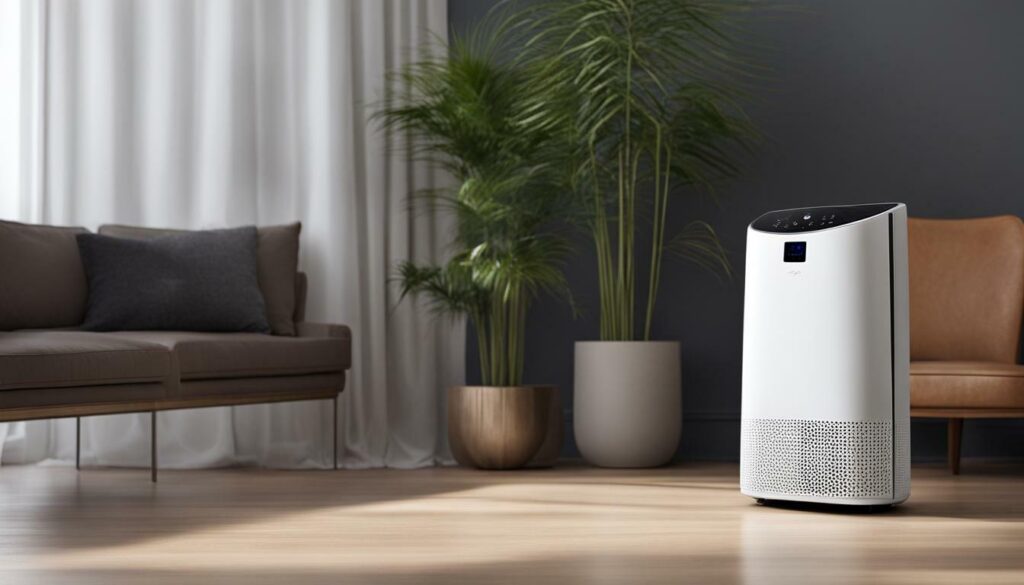
Conclusion
Air purifiers are a valuable ally in the management of asthma symptoms and improving indoor air quality. By filtering out common asthma triggers, such as allergens, pollutants, and irritants, air purifiers help provide a healthier living environment for individuals with asthma.
In addition to using air purifiers, it’s important to take other steps to improve indoor air quality, such as regular cleaning, minimizing sources of pollution, and proper ventilation. When selecting an air purifier, consider important factors like the type of air purifier, filtration system, and room size.
By using air purifiers and following additional tips for improving indoor air quality, individuals with asthma can experience relief from their symptoms and enjoy a cleaner and healthier living environment. Invest in a top-rated air purifier today to start feeling the benefits!
FAQ
Q: Can air purifiers help with asthma symptoms?
A: Yes, air purifiers can be beneficial for individuals with asthma. They help to remove allergens, pollutants, and irritants from the air, reducing the triggers that can worsen asthma symptoms.
Q: What causes asthma?
A: Asthma is a chronic respiratory condition that can be caused by various factors, including genetics, allergies, and environmental factors. It is characterized by inflammation and narrowing of the airways, leading to symptoms such as wheezing, coughing, and shortness of breath.
Q: How does indoor air quality affect asthma?
A: Poor indoor air quality can worsen asthma symptoms and trigger asthma attacks. Dust, pet dander, mold spores, and other allergens can accumulate indoors and contribute to respiratory issues. Using air purifiers can help to improve indoor air quality and reduce asthma triggers.
Q: How do air purifiers work?
A: Air purifiers work by using filters to capture and remove airborne particles, including allergens, dust, pollen, and pet dander. Some air purifiers also use additional technologies like UV light or ionizers to neutralize bacteria and viruses.
Q: What should I consider when choosing an air purifier for asthma?
A: When selecting an air purifier for asthma, consider factors such as the type of purifier (HEPA, activated carbon, etc.), the size of the room it will be used in, and the specific filtration needs for asthma triggers. Look for air purifiers that are specifically designed for allergy and asthma relief.
Q: Besides using air purifiers, are there other ways to improve indoor air quality?
A: Yes, in addition to using air purifiers, there are other steps you can take to improve indoor air quality. These include regularly cleaning and vacuuming, minimizing sources of pollution, ensuring proper ventilation, and maintaining a smoke-free environment.
Q: What are the benefits of using air purifiers for asthma management?
A: Air purifiers can provide several benefits for asthma management. They can help to reduce asthma symptoms, minimize asthma triggers, improve respiratory health, and create a healthier living environment by removing harmful particles from the air.
Q: Which air purifiers are recommended for asthma?
A: There are several top-rated air purifiers that are recommended for individuals with asthma. Look for models that have been tested and proven effective in reducing asthma symptoms and improving air quality. Some popular options include the Honeywell HPA300, Coway AP-1512HH, and Blueair Blue Pure 211+.
Q: How should I maintain and care for my air purifier?
A: Proper maintenance and care are important for the longevity and efficiency of your air purifier. This includes cleaning or changing filters regularly, following the manufacturer’s instructions for maintenance, and keeping the unit clean from dust and debris.
Q: In conclusion, can air purifiers help individuals with asthma?
A: Yes, air purifiers can be valuable allies in managing asthma symptoms and improving indoor air quality. By removing asthma triggers from the air, they can help to reduce symptoms and create a healthier living environment for individuals with asthma.
Disclaimer: As an Amazon Associate we earn from qualifying purchases. Product images on this blog are courtesy of Amazon.



